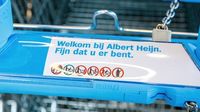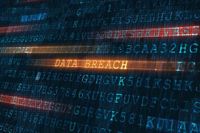Ahold Delhaize, the parent company of supermarket chains Albert Heijn and Delhaize, is facing a serious cyber threat after hackers claimed to have stolen a staggering six terabytes of sensitive data from its American systems. The attack, attributed to the ransomware group INC Ransom, occurred in November 2024 but has only recently come to light, raising alarms about the potential release of confidential information.
According to Cybercrimeinfo, a platform that monitors cyber threats, the hackers are threatening to publish the stolen data unless their demands are met. This incident marks a significant breach for Ahold Delhaize, which operates multiple supermarket brands in the United States, including Food Lion, Hannaford, Stop & Shop, and Giant Food.
In a statement, a spokesperson for Ahold Delhaize confirmed the occurrence of the cyber incident and noted that the company reported the security breach to authorities back in November. "We are currently conducting an investigation to determine the extent of the data breach, and we will notify affected individuals as appropriate," the spokesperson said. The company has taken precautionary measures by taking certain systems offline, which led to disruptions in pharmacies and online services in the U.S. However, normal operations were quickly resumed.
Cybercrimeinfo has indicated that INC Ransom has been active since July 2023, targeting numerous organizations worldwide, particularly in the healthcare sector. The group has previously attacked hospitals in the United Kingdom, stealing and leaking sensitive patient data. The methods used in these attacks suggest a well-organized group of cybercriminals with potential ties to Russia.
As the investigation continues, Ahold Delhaize has refrained from disclosing specific details about the stolen data. However, the company emphasizes its commitment to informing those involved in accordance with legal obligations. The identity of the hackers remains unknown, but their tactics and targets have raised suspicions about their origins.
In a troubling development, reports suggest that Ahold Delhaize may be in negotiations with the hackers, who are demanding a ransom estimated between €1 billion and €2 billion. Such a sum would be unprecedented in the realm of ransomware attacks and underscores the severity of the situation.
While the hackers have not yet made any concrete demands public, their threat to release the data follows a classic ransomware pattern, where cybercriminals typically ask for high ransoms in cryptocurrencies. This situation has put Ahold Delhaize in a precarious position, as they work to mitigate the fallout from this breach.
The incident has sparked concern not only within Ahold Delhaize but also among its customers and stakeholders. With the increasing frequency of cyberattacks, many are left wondering how secure their personal information is when dealing with large corporations.
Experts in cybersecurity have noted that the tactics employed by INC Ransom mirror those used in previous attacks on healthcare institutions, where sensitive information was compromised. The ongoing investigation is crucial for understanding the full scope of the breach and for implementing stronger security measures to prevent future incidents.
In the wake of this incident, Ahold Delhaize is under pressure to demonstrate transparency and accountability. As they navigate the complexities of the situation, the company faces the challenge of restoring trust among its customers and partners.
As the story unfolds, Ahold Delhaize's response to this cyber threat will be closely monitored by industry experts and the public alike. The implications of this attack extend beyond the immediate concerns of data security; they highlight the vulnerabilities that exist within major corporations and the ongoing battle against cybercrime.
In related news, the ransomware group INC Ransom has also claimed responsibility for attacks on other organizations, including the State Bar of Texas and Michigan-based McLaren Health Care. This pattern of targeting various sectors raises alarms about the group's capabilities and intentions.
As Ahold Delhaize continues to work with third-party cybersecurity experts to assess the damage, the company is also collaborating with law enforcement to address the situation. The outcome of these efforts will ultimately determine the effectiveness of their response and the potential repercussions of the breach.
In conclusion, the cyberattack on Ahold Delhaize serves as a stark reminder of the growing threat posed by ransomware groups. As organizations increasingly rely on digital systems, the need for robust cybersecurity measures has never been more critical. The situation remains fluid, and stakeholders will be watching closely as Ahold Delhaize navigates this challenging landscape.










